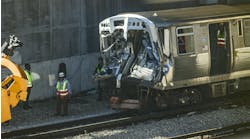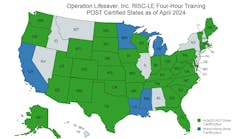In support of Sexual Assault Awareness Month and International Anti-Street Harassment Week, Metro Transit Police (MTPD) will join Collective Action for Safe Spaces (CASS) and Stop Street Harassment to raise awareness of sexual harassment prevention efforts on public transportation on April 12.
An important component of a multi-layered campaign to combat sexual harassment, Metro each year partners with CASS, Stop Street Harassment and local law enforcement to encourage victims and bystanders of sexual harassment or assault to report it immediately.
“Metro is working to make all riders feel safer and more comfortable on the system, and raising awareness about sexual harassment is an important part of that effort,” said Assistant General Manager of Customer Service, Communications & Marketing Lynn Bowersox. “We thank local advocates who are educating the public about the need to report these incidents.”
To amplify the message that sexual misconduct will not be tolerated, Metro Transit Police will hold high-visibility outreach events today, during evening rush hour at the following five Metrorail stations:
Metro Center
4:00 – 6:00 p.m.
Tenleytown-AU
4:00 – 6:00 p.m.
Shaw–Howard U
4:00 – 6:00 p.m.
Takoma
4:00 – 6:00 p.m.
Clarendon
4:00 – 6:00 p.m.
“The outreach events that we host along with our partners each year reinforce the importance of reporting unwanted or otherwise inappropriate behavior on Metro,” said Metro Transit Police Chief Ron Pavlik. “Telling Transit Police about your experience can help our detectives identify trends and prevent others from becoming victims.”
Together with local advocacy groups, Metro has successfully implemented a number of tools to help victims of sexual harassment or assault report their experiences, including a web-based reporting form (wmata.com/harassment) and email address ([email protected]), enhanced training for police and front-line employees, on-system advertising and public reporting of trends.
In addition, riders can now communicate with Metro Transit Police via text simply by sending a message or photo to “MyMTPD” (696873).
First-ever Survey Measures Harassment, Reporting on Metro
Metro also released results from a first-of-its-kind, representative survey of customers’ awareness of – and comfort with – reporting sexual harassment on Metro.
“We applaud Metro for once again being a national leader among transit systems,” said Holly Kearl, founder of Stop Street Harassment. “The results of this ground-breaking survey will allow us to better understand sexual harassment on our system and know how we can best work to address and end it.”
The survey tool was developed in partnership with CASS and Stop Street Harassment to serve as an additional measure to evaluate the effectiveness of Metro’s public outreach efforts to reduce incidents of sexual harassment and assault on the system.
The survey sought to answer four main questions:
- How comparable is the Washington metropolitan region to national rates of sexual harassment, specifically on public transportation?
- Do customers experience sexual harassment or assault incidents on Metro?
- Do our customers know how to report sexual harassment or assault incidents that occur on Metro?
- Are customers familiar with the PSA ads running in the system that raise awareness about the issue of sexual harassment in public spaces and encourage victims to report incidents to police?
“Sexual harassment occurs in public spaces all across our city, with particularly high incidence on public transit,” says Jessica Raven, Executive Director of Collective Action for Safe Spaces. “With Metro’s leadership, we’re learning more about how we can effectively address this problem, and we’re developing a model that we can apply to public spaces citywide.”
Survey highlights:
- Sexual harassment on public transportation in the region (21%) is comparable to that in the nation (18%)
- Forty-one percent of Metro customers are familiar with the anti-harassment educational campaign.
- Those reporting familiarity with the campaign were twice as likely to report their harassment experience.
- Women are three times as likely as men to experience sexual harassment on Metro.
- Harassment is more prevalent on the rail system than on buses.
- Verbal forms of harassment are the most common form experienced by Metro customers.
The report presents the findings of a 1,000-person, regionally representative survey conducted in January by a third-party vendor.


